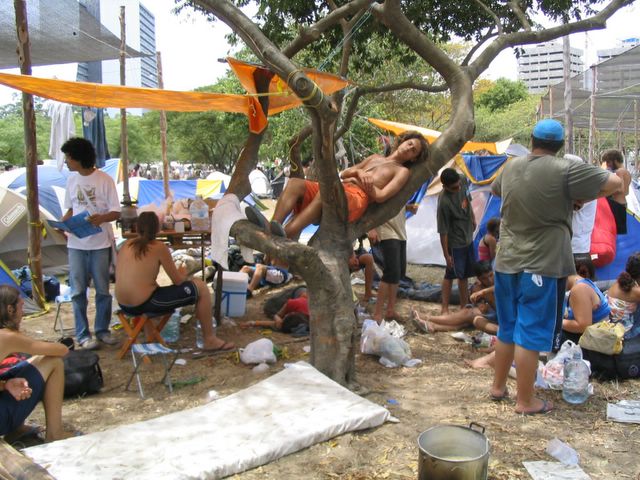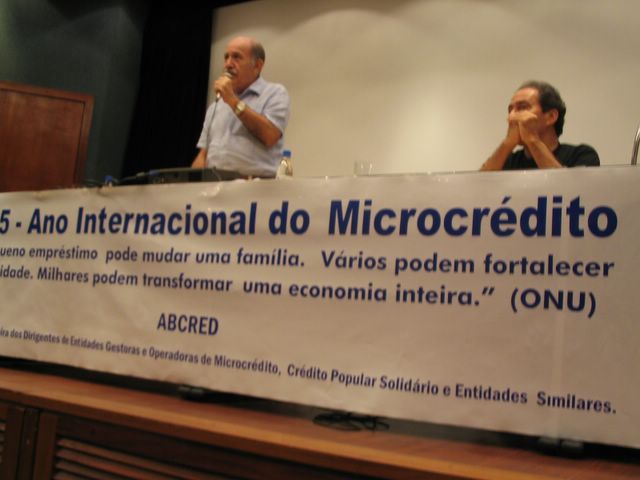Monday, February 14, 2005
wsf 6: microfinance!
While at the Forum I stayed in the "Acampamento Juventude," which was greatly reminiscent of the great tent cities there used to be at Phish's large summer festivals. Imagine a modestly-sized park filled with, by the official estimate, 35,000 people. Prohibitively long lines for the showers, only not enough portalets to go around. I'm getting old and crotchety, yet I still kind of loved it. I started out in the hip-hop section of the camp, which basically meant that really bad Brazilian MCs freestyled over weak canned beats (but with excellent amps) until 5:30am every night. Then the public address would come on at 8am announcing the day's events in Portuguese (and, as always, pleading for English translators to rise out of their tents and pitch in -- I never quite made it) leaving, you can do the math, very little time for sleeping. After a couple days of this I moved to another section where, though the 8am wakeup call was the same, if I stayed up until 4:30 debating politics with 18 year old Marxists at least I had only myself to blame. Here is a fairly representative picture:

Though there were various special events and speeches (notably Lula and Hugo Chavez) the meat of the Forum was the workshops. There were literally thousands of workshops held in rooms and tents all over the city. The organizers divided the workshops into 11 "thematic spaces." The individual workshops were given by whoever wanted to give them. Any organization in attendence could simply submit a title and be given a room. This had some real advantages (democratization, variety, lots of workshops) and disadvantages (many of the workshops didn't actually occur). My friend Rebecca, who herself gave a workshop, joked with me that there were three basic types of workshop. (Snarky comments to follow.)
The first I will call the "hater" workshop. Someone gets up and talks about how the US/the West/capitalism/corporations/etc. is bad and needs to be stopped. There was a lot of this -- it was maybe the most common kind of workshop. The second type was the "special interest" workshop. Basically, in this workshop an obscure NGO or group of people present their work. The work is probably good and worthwhile, but you really need to be a specialist to understand the context and get anything out of it. Examples:
- Participatory Management of Hydrographic Basins: Lessons Learned, Trends, and Challenges
- Digital Inclusion: The Experience of the Accessa São Paulo Program
- Is Independent Latin Photo-Journalism Possible?
The last kind is the "connections" workshop. In this workshop, several seemingly unrelated related issues are brought together and discussed. Rebecca's workshop on "Forest Rights, Indigenous Communities, and Academia" fits squarely into this category. There is also a fun game where you make up workshops from this category.
And to this I should add a hidden fourth category, unknown to Rebecca, which is the "what the fuck?" workshop. Like this one:
- Carbon Trade and the Commodification of the Atmosphere: What Next?
Huh? What next indeed. Most environmentalists support carbon trading as a way to reduce worldwide carbon emissions (some think it's not enough, but that's another issue) but the people running this workshop have bizarrely recast the debate as a public goods/privatization issue, as if it were water rights or something. But there are no carbon rights -- no one wants atmospheric carbon! It's a pollutant and it's not in short supply. I desperately wish I had gone to this workshop just to administer a beatdown.
In any event, reading the program it soon became clear all the workshops that interested me had been shoved into one particular "thematic category":
- Autonomous Thought: Reappropriation and Socialization of Knowledge and Technologies
What did it mean? I'm wasn't sure, but on the first day of the Forum I climbed out of my tent at 8am sharp, after two beautiful hours of rest in that maelstrom of radical Brazilian youth, put on my most presentable rumpled clothing, and packed off to the Autonomous Thought section in search of... microfinance. Yes, I had ostensibly come to Brazil to learn something about microfinance, and here was a genuine opportunity.
The morning was clear and my spirits were high as I walked among the waterfront industrial warehouses that had been converted into conference rooms. There were many others out, ID lanyards around their necks, programs in hand, searching for the right rooms. And suddenly I noticed something: these people were adults. Where were the 19 year old hippies? Apparently back at the camp smoking a morning bowl. These people were in their 30s, 40s, and 50s. They wore clean clothing, and the crispness of their step suggested 8 hours sleep in a good hotel. I was consistantly shocked by how little of the conference most of the young people actually attended.
What to say about the microfinance workshops? Well, they appeared to be part of an entirely different conference than the Acampamento. The attendees were almost exclusively people working for microcredit organizations all over Brazil. On the first day we went around introducing ourselves and I was one of the least-credentialed people in the room. Many people wore suits. One of the workshops was actually held in a conference room of Porto Alegre's Central Bank. It looked like this:

In November of 2004 President Lula announced a new initiative to create a federal microfinance program, and much of the debate focused on what form this new program would take, and how to make the transition. People talked a lot about two possible models for the new program, which I'll call "open" and "targeted." The open model seeks the widest access possible, with a minimum of transaction costs. Little attention is paid to vetting the business plans of potential borrowers, or supervising how they spend it. Anyone who wants credit and meets the basic requirements can have it. The targeted model explicitly seeks to use microfinance as a tool for "local development." In this model much more work goes into vetting clients and much more attention paid to how they are going to use the money. Often training of some sort will be offered with the loan. And credit may be withheld from people whose enterprises the lenders believe won't help the community.
The majority of the participants came down on the side of the targeted model. I tend to favor the open model. First, I believe that virtually all microenterprise will help the local community, and that even if some does not, people looking at business plans are unlikely to be able to figure out which is which. I think that by cutting down administrative costs and expanding access you have the potential for much greater impact. I also think that as soon as you ration access you introduce the possibility of politicking. Who gets it and who doesn't are more likely to be determined by who one's friends are (or who pays bribes -- this is Brazil after all) than by merit. I think that adding an extra level of supervision and rationing invites corruption.
Did I raise these points? Well, I was having a hard enough time following the conversation. My doubts about understanding the models correctly, together with my fear of making some huge mistake in Portuguese, plus the natural fear of speaking in front of a large group of experts effectively silenced me.
On the second day the workshop was moved to the Bank, and the crowd was even more distinguished. Brazil's Secretary of Planning spoke from the audience (he wasn't even on the panel) and told a funny story. He had first gone to the tents of the Forum, but found a sign telling him to go to... the Central Bank. He asked someone directions and was told "keep going right!" He finally got there and was surprised that "it wasn't very far after all." This became a little speech on how microfinance had recently moved from the left to the center and from the fringes to the mainstream, and what this might mean for the movement. You kind of had to be there -- he was a really funny guy. There was more discussion about the national program, including political economy stuff I definitely don't know much about. One speaker talked about how, by making this a government policy, it became vulnerable to partisan politics. Apparently a few years ago the city of Belém had a very successful municipal program, but it was completely shut down when the city government changed. Now they are worried that switching much of the microcredit portfolio from independent NGOs to federal bureaus would make it vulnerable when Lula leaves office. This type of political sustainability seemed a larger issue for the participants than financial sustainability, which the only thing I've studied in the past.
All in all, I greatly enjoyed the microcredit conference. Unsurprisingly, I found it the most worthwhile thing at the Forum. It was a little island in a sea of generally unnuanced anti-capitalism. I wondered what the participants in the thematic group "Sovereign Economies: For the People Against Neoliberal Capitalism" (that's not a workshop but one of the 11 categories of workshop) would do if suddenly plopped down there in a room full of people talking about finance. I looked for other things like it at the Forum, but there wasn't much. So yes, the Forum had a diversity of workshop topics. But the proportions were 99%/1% at best.